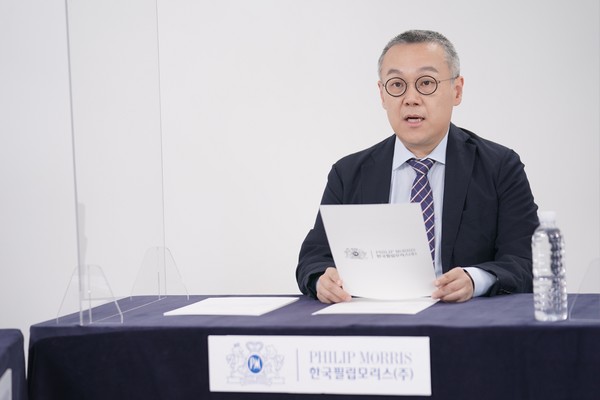Philip Morris International Korea expects that the U.S. Food and Drug Administration’s designation of IQOS, its heat-not-burn tobacco, as a modified risk tobacco product (MRTP) will prompt a change in the local tobacco regulations.
The FDA grants MRTP status to products that have demonstrated that is expected to benefit the population's health in general by reducing harmful or potentially harmful chemicals, PMI Korea said.

"The MRTP classification substantiates PMI's claims that the IQOS benefits public health as a whole," PMI Korea CEO Paik Young-jay said in an online news conference Wednesday. "This decision can set the basis for policymaking concerning better alternatives products, and help adult smokers switch from regular cigarettes to scientifically proven heat-not-burn tobacco as soon as possible."
Acknowledging that quitting is the best option for a person's health, Paik said the no-smoking campaign should continue. “However, we should not give inaccurate information on tobacco to consumers in the course of stressing the importance of quitting, nor implement ‘ideological regulations,’ not based on science,” Paik said.
If incorrect information is given to smokers while not encouraging them to shift to less harmful products, smokers will end up consuming the most harmful form of regular cigarettes. This can result in a loss for individuals’ health, public health and society as a whole.
“The recent classification of IQOS as MRTP results from the rigorous review of independent scientific studies, which analyzed the device's ability to reduce exposure to harmful or potentially harmful chemicals to users compared with conventional cigarettes,’ Paik said.
Paik's remarks came in response to a study released by the Ministry of Food and Drug Safety in 2018, claiming that e-cigarettes were as harmful as conventional products.
The ministry stressed that heat-not-burn cigarettes, which the public has often perceived as being less harmful to health than ordinary tobacco, were found to have more tar than the latter, and have the same nicotine content. The ministry then concluded that there was no evidence to show heat-not-burn cigarettes as less harmful than ordinary cigarettes.
Commenting on the ministry's previous study results, Paik pointed out that even the ministry’s report had confirmed that nine substances recommended for reduction by the World Health Organization decreased by more than 90 percent on average compared to regular cigarettes.
"However, the ministry published a study focusing only on the tar level," Paik said. "Tar refers to the total amount in tobacco emissions, not a single substance. Still, the ministry compared only the tar's weight as if the entire tar was a harmful substance.
The Korean and U.S. regulators' analysis results of heat-not-burn cigarettes were similar, he added.
Paik asked the government for a more transparent and accurate communication that can solve the people's curiosity, stressing the company believes that regulating smoke-free products like that on regular cigarettes is no different from pushing smokers to continue using traditional cigarettes.
"The FDA's decision is an important example of how governments and public health agencies can regulate heat-not-burn products and cigarettes differently to improve public health," Paik said. "The FDA has reached its conclusion to approve ours as the first risk-reducing tobacco products even in the absence of long-term epidemiological evidence."
The FDA has also said that when combined with the company's evidence, there is a reasonable likelihood that individual smokers' disease incidence or mortality rate in subsequent studies will be measurable and significantly reduced, he added.
Paik stressed that the Korean government should try to find an approach that best fits the local situation. According to PMI Korea, about one in five Korean adults are smokers, but regular cigarettes still occupy more than 85 percent of the total tobacco market.
"By analogy, this means that more than 8 million smokers still smoke conventional cigarettes in Korea," he said. "They also have the right to receive accurate, science-based information to make better choices."
PMI Korea has consistently emphasized the need for regulation through open dialogue and debate, not because it aimed to abolish or weaken them but to implement more reasonable and differentiated controls.
"We have suggested that rational regulation in proportion to the degree of harm is necessary," he added. "It’s natural worse products deserve stronger regulations than better products."

